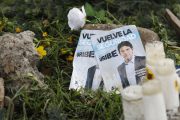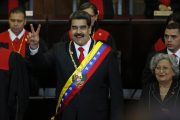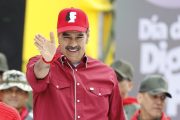Venezuela’s Marxist president, Hugo Chavez, will be attending the meeting of Mercosur, the South American Common Market, in Rio de Janeiro, on July 31, for the formal induction of Venezuela into the trade group as a full member. The move is controversial for a number of reasons, not the least being that Chavez’s increasingly dictatorial regime is being granted membership at the same time that Paraguay, a founding member of Mercosur, has been suspended from membership for its impeachment in June of President Fernando Lugo, a revolutionary comrade and protégé of Chavez.
The governments of Uruguay, Argentina, and Brazil, all headed by radical-left presidents, joined Venezuela’s Chavez in denouncing the Lugo impeachment as a “coup,” even though the action had been legally carried out by a united Congress, and Paraguay’s Supreme Court had ruled that the process had meticulously followed the Constitution’s requirements. Argentina, Brazil, Uruguay, and Paraguay are full members of Mercosur, while Chile, Bolivia, Colombia, Ecuador, and Peru are associate members. Chavez has been trying to get Venezuela into Mercosur for years, but has been blocked from doing so by opposition within the Paraguayan Congress. The Lugo impeachment provided Chavez and his key allies — Brazilian President Dilma Rousseff, Argentine President Cristina Fernandez de Kirchner, and Uruguayan President Jose Mujica — the pretext they desired to remove the Paraguayan obstacle.
Paraguay’s President Federico Franco, who was constitutionally installed following Lugo’s impeachment, points out that it is Chavez and his Mercosur comrades who have actually engaged in a coup, by illegally suspending Paraguay’s membership and inducting Venezuela in violation of the Mercosur treaty.
“The incorporation of Venezuela is null and void, illegitimate in its origin,” said President Franco, as reported by MercoPress on July 24. He added that the Mercosur treaty is very clear “and states that all decisions must be unanimous, and having left Paraguay out (suspended) the other members are violating a substantial aspect” of the compact.
Franco, who was elected as vice president under Lugo, was sworn in as president on June 22 to fill out the remainder of Lugo’s term, which runs until August 2013.
Chavez Croons to “Beloved Comrade” Dilma Rousseff
“I’ve had a most satisfying chat with President Dilma, our most beloved compañera. She confirmed I’m invited to the Mercosur summit,” said Chavez on July 20 via his Twitter@chavezcandanga. The message was followed by a second tweet in which he asserted, “Venezuela to Mercosur! This is really GREAT! A new Venezuela! A new South America! New Geopolitics!”
The Chavez-Rousseff political love affair is nothing new; there are plenty of videos on YouTube from broadcasts over the past couple of years in which Chavez and Rousseff express their love and admiration for one another, as well as their revolutionary solidarity. (See here for Chavez’ 2010 “hugs and kisses” bouquet to Rousseff congratulating her on her election victory.) Rousseff, the former terrorist and chief of staff to her predecessor, President Luis Inacio “Lula” da Silva, now presides over the world’s sixth largest economy (Brazil overtook the United Kingdom this year) and Latin America’s most powerful country. And, like her “beloved compañero,” Hugo Chavez, she is using her newfound power and wealth to spread Castro-inspired, Havana-style revolution throughout the hemisphere.
President Rousseff did not attend this year’s gathering in Caracas, Venezuela, of the communist-socialist São Paulo Forum, SPF (Foro de São Paulo, or FSP, in Portuguese) but was represented there by her communist Workers Party (Partido dos Trabalhadores, or PT, in Portuguese). Hosted by Hugo Chavez July 4-6, the annual confab drew hundreds of leaders representing dozens of communist, socialist, and radical environmentalist parties throughout the hemisphere, as well as from China, Russia, Vietnam, Lebanon, Iran, France, Spain and Greece, among others.
Founded in 1990 in the city of São Paulo by Brazil’s Worker’s Party and Cuba’s Communist Party, the São Paulo Forum (SPF) has become the premier instrument of hemispheric communist-socialist forces that aim at nothing less than Sovietized Latin America. (For background on the São Paulo Forum, see here, here, here, and here.)
For the past couple of decades, while the SPF has been making alarming inroads throughout Latin America, the U.S. State Department and the major U.S. media have almost completely ignored its existence. Strangely, so too have most conservative U.S. politicians, analysts and publications. While Hugo Chavez’s dramatic anti-American antics and his subversive schemes can be counted on to elicit reactions from America’s “right-wing” commentators, the much more serious unified SPF efforts — of which Chavez’s actions constitute only a part — go largely unnoticed and unremarked. In fact, Chavez’s overtly radical persona and his notoriously anti-American diatribes serve to make Rousseff, Lula and other SPF leaders appear moderate by comparison, even though they are every bit as radical as Chavez and his main mentors, Fidel and Raul Castro.
SPF Tentacles Strangling Freedom in the Hemisphere
The reach of the SPF is formidable; its members now control the main political offices in most of Latin America. In Brazil, the Workers’ Party (PT) of Lula and President Rousseff works closely and openly with the Communist Party of Brazil and the Brazilian Socialist Party, both of which have members serving in the Rousseff government. Valter Pomar, a top PT official and a longtime adviser to both Lula and Rousseff, serves as the executive secretary of the SPF and is its most quoted spokesman. Venezuela, of course, is ruled by Chavez’s United Socialist Party of Venezuela, which plays a major role in setting (and funding) the SPF agenda.
Other countries controlled by SPF members include:
Bolivia — headed by President Evo Morales and his Movement For Socialism;
Cuba — headed by Raúl Castro and the Communist Party of Cuba;
Dominica — headed by President Roosevelt Skerrit and the Dominica Labour Party;
Dominican Republic — headed by Leonel Antonio Fernández Reyna and the Dominican Liberation Party;
Ecuador — headed by President Rafael Correa and the PAIS Alliance;
El Salvador — headed by President Mauricio Funes and the Farabundo Martí National Liberation Front (FMLN);
Nicaragua — headed by Daniel Ortega and the Sandinista National Liberation Front (FSLN);
Peru — headed by President Ollanta Humala and the Peruvian Nationalist Party;
Uruguay — headed by President José Mujica and the Broad Front;
To the countries listed above should be added Argentina, where President Cristina Fernandez de Kirchner has adopted the full FSP socialist agenda and closely identifies with Chavez, Castro, Lula, and Rousseff. However, since Argentina has a large and influential Jewish population, Fernandez de Kirchner, out of political expediency, has been forced to steer away from endorsement of the SPF’s official program, which is anti-Israel and militantly supports Iran, Syria, Hezbollah, Hamas, and the PLO.
SPF to the Rescue for Chavez’s October Election Campaign
Hugo Chavez, who has held power since 1999 (longer than anyone else currently in office in Latin America, unless one considers Raúl Castro simply an extension of Fidel) is believed by many political observers to have a fairly safe lead over Henrique Capriles Radonski, his challenger in the October presidential elections. In addition to his control over the media and his access to virtually unlimited funds through the state oil production and many other state companies, Chavez can, and does, use his political mobs and government offices to intimidate and silence opposition and reward supporters. However, his oppressive “Bolivarian revolution” is wearing thin with many Venezuelans, and even many erstwhile liberal-left supporters in the United States have been forced to acknowledge that his authoritarian tendencies are looking more and more like Cuba’s totalitarian repression.
On July 17, the Washington, D.C-based Human Rights Watch released a devastating 133 page report, “Tightening the Grip: Concentration and Abuse of Power In Chavez’s Venezuela,” which documents the Chavez regime’s systematic destruction of liberty. “For years, President Chávez and his followers have been building a system in which the government has free rein to threaten and punish Venezuelans who interfere with their political agenda,” said José Miguel Vivanco, Americas director at Human Rights Watch. “Today that system is firmly entrenched, and the risks for judges, journalists, and rights defenders are greater than they’ve ever been under Chávez.”
This is not the first or only accusation of widespread human rights abuses by the Chavez government; reliable and verified reports have been regularly published for years. However, the abuses have now become so widely known and publicly recognized that Chavez is feeling genuine pressure on the issue. On July 26, Chavez’s Foreign Minister Nicolas Maduro announced that Venezuela will soon be pulling out of the Organization for American States (OAS) regional human rights convention, as well as leaving the Inter-American Court of Human Rights and the Inter-American Commission on Human Rights. The planned withdrawals are, in themselves, a strong vindication of the claims by many of Chavez’s opponents and critics and will not play well with voters.
Brazil’s Lula da Silva, who was not able to attend the SPF personally, nevertheless let it be known via video that he wholeheartedly supports his longtime comrade. Reuters reported on July 9:
Lula himself dived into the race on Friday, warmly endorsing his friend Chavez in a video played at the Forum of Sao Paulo, a socialist conference hosted by the government in Caracas.
“With Chavez’s leadership, the people have made truly extraordinary achievements … these must be preserved,” Lula said. “Chavez, count on me … count on the solidarity and support of every leftist militant, every democrat and every Latin American. Your victory will be our victory.”
But Lula and the PT are sending more tangible assistance in the form of political consultant Joao Santana, nicknamed the “maker of presidents.” Santana has managed campaigns for Lula, Dilma Rousseff and other regional leaders. He is credited with devising the makeover of Lula from a rough-and-tumble communist union leader to a “moderate” acceptable to the middle class voters and business owners. Santana coached Lula on all matters concerning image, from trimming his beard and donning a suit and tie, to dropping his Marxist rhetoric, smiling more often and adopting campaign messages that emphasized greater economic prosperity through programs that sounded benign. Santana did the same for Rousseff, helping transform her from a raging, armed Castroite radical to a chic fashionista who sells socialism wrapped in verbiage that sometimes sounds almost as if she is advocating free market economics.
Now Santana is working to soften Chavez’s belligerent image and bellicose rhetoric. The Mercosur coup is undoubtedly a key part of the PT/Santana campaign strategy, aimed at making Chavez look more mainstream and showing Venezuela’s voters that Chavez has scored a major diplomatic victory that will pay off in the form of economic dividends for workers and consumers.
Related articles:
Olavo de Carvalho on Communism in Latin America
Putin Recharged: What Now for Russia — and the World?
Resurgent Communism in Latin America
South American Union Selects Socialist Leaders
Tensions Grow as Socialists Slam Ouster of Paraguay Leader as “Coup”
Photo: Venezuela’s President Hugo Chavez speaks as he is accompanied by a Brazilian commission at the Miraflores presidential palace in Caracas, Venezuela, July 25, 2012: AP Images




